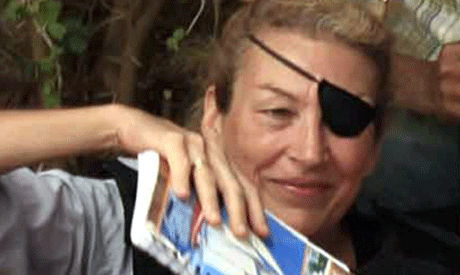
Journalist Marie Colvin in Misrata June 2011 wearing an eye patch after an injury from a Shrapnel wound in Sri Lanka in 2011 (Photo: Reuters)
Two award-winning western journalists were killed in the besieged Syrian city of Homs on Wednesday when shells hit the house they were based in, opposition activists and witnesses said.
Marie Colvin, an American journalist working for the UK broadsheet Sunday Times and the French photographer Remi Ochlik, were reporting from the besieged Syrian city of Homs when the attack happened. A witness told Reuters by phone that shells hit the house where the journalists were staying and a rocket hit them as they attempted to escape.This follows the deaths of New York Times journalist Anthony Shadid and French television reporter Gilles Jacquier in Syria this year.
Ochlik, 28, recently won the first prize in the general news category of the World Press Photo contest for his works capturing the Libyan revolution in 2011.
Colvin was the only British newspaper journalist on the ground at the time and had reported horrific scenes to the BBC, including watching a 2-year-old child die from shrapnel, the day before she died."It's absolutely sickening," Colvin said to British television channel on 21 February, "I counted 14 shells hitting just this civilian area... within 30 seconds."
Colvin, who lost her eye to a grenade in Sri Lanka 2001, was veteran of many conflicts including covering the January 25 Revolution. Ahram Online journalist who was working for the London Evening Standard at the time, spoke to Marie Colvin in February 2011 about the difficulties of being a female correspondent covering war zones. Colvin was reacting to the news coverage of the brutal attack on Lara Logan in Tahrir Square during the celebrations of Mubarak's ouster.
"I've been shot at, I've been chased by a mob but it never becomes a question when a man is attacked whether he should stay at home," she said, after the public denouncement of Logan for putting herself in dangerous situations in Egypt when she has children. "We female correspondents are always questioned even though quite a few male correspondents have family and children."
Colvin pointed out that internationally renowned correspondents like John Simpson, who have families with young children, were also on Tahrir that night. As a mother herself, she added "I care about my child, I do it as well as a man, it's infuriating .We women are very responsible people, we don't just leave babies with a bottle behind and get on a plane."
Colvin was one of the few western journalists to point out that there was a "new crowd" on the square the night of Logan's attack, as the army had "opened the floodgates, everyone was allowed in." Identifying those who attacked the American journalist as different to the protesters, Colvin added that the Egyptian army usually checked people's IDs but the night Mubarak stepped down, they refrained from doing so.
Twitter and traditional media has been awash with condolences for the well-respected writer and photographer. However over 7,300 Syrians have been killed by the regime of President Bashar Al-Assad in a conflict that these two journalists tried to shed light on. Colvin herself in February talked about "deeply caring" about her work, which she saw as "bearing witness to what is going on in these countries", rather becoming the story.
Extracts from the interview with Marie Colvin were published in the London Evening Standard newspaper on 17 February, 2011.
Short link: